|
|
|
Sort Order |
|
|
|
Items / Page
|
|
|
|
|
|
|
| Srl | Item |
| 1 |
ID:
149557
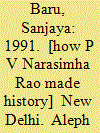

|
|
|
|
|
| Publication |
New Delhi, Aleph Book Company, 2016.
|
| Description |
216p.hbk
|
| Standard Number |
9789384067687
|
|
|
|
|
|
|
|
|
|
|
|
Copies: C:1/I:0,R:0,Q:0
Circulation
| Accession# | Call# | Current Location | Status | Policy | Location |
| 058918 | 923.2/BAR 058918 | Main | On Shelf | General | |
|
|
|
|
| 2 |
ID:
125283
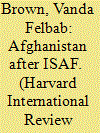

|
|
|
|
|
| Publication |
2013.
|
| Summary/Abstract |
Summer 2013 brought one of the most violent fighting seasons in Afghanistan since the US military and state-building effort began in 2001. On the cusp of the momentous 2014 presidential elections and a year before the majority of international coalition forces would depart from the country in the midst of transferring security functions to the coalition-supported Afghan National Security Forces (ANSF), the Taliban is dug in and still ferocious. It is testing the Afghan security forces, which since June 2013 are supposed to be taking the lead in providing security throughout the country while international forces are increasingly disengaging from combat and departing Afghanistan.
|
|
|
|
|
|
|
|
|
|
|
|
|
|
|
|
| 3 |
ID:
133161
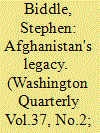

|
|
|
|
|
| Publication |
2014.
|
| Summary/Abstract |
The war in Afghanistan is not over. Nor is it ending any time soon. The U.S. role may end in 2016, in whole or in part, but the war will continue-and its ultimate outcome is very much in doubt. The conflict is now stalemated militarily, and will likely stay that way as long as outsiders pay the large bills needed to keep the Afghan National Security Forces (ANSF) in the field and fighting. The war will thus grind onward until this funding dries up or the two sides negotiate a compromise settlement, neither of which is imminent. Depending on how any talks unfold, historians in 2050 could thus look back on this war as a costly but tolerable outcome for the West, as a wasteful disaster, or as something in between; for now, all we know for sure is that it continues.
|
|
|
|
|
|
|
|
|
|
|
|
|
|
|
|
| 4 |
ID:
178417
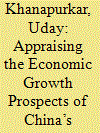

|
|
|
|
|
| Summary/Abstract |
This article examines the economic growth prospects of China’s services sector. Reportage on China’s economy and its data releases tends to focus largely on aggregate GDP growth, manufacturing growth, retail sales and investments, and fails to adequately cover services despite them being the largest contributor to growth. The article parses the growth of China’s various services subcomponents across a range of parameters and assesses that the industry has come under duress with a slowdown in complementary manufacturing and the dissipation of growth bubbles in finance and real estate. It is further observed that reforms necessary for spurring services growth are at a nascent stage, proceed slowly, and are imperilled by GDP growth targets that result in policies favouring the manufacturing industry. In sum, while China’s services growth prospects are hardly in dire jeopardy due to favourable demand-side conditions, achieving potential and affecting convergence with high income countries will necessitate the expedition of reforms and the engineering of a sustained high growth phase in the sector.
|
|
|
|
|
|
|
|
|
|
|
|
|
|
|
|
| 5 |
ID:
133463
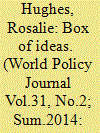

|
|
|
|
|
| Publication |
2014.
|
| Summary/Abstract |
CANKUZO PROVINCE, Burundi-Last November, Sedar Zamukulu Watula and 30 other Congolese refugees waited, perched on a circle of wobbly wooden benches in Kavumu Refugee Camp in western Burundi. Watula, 27, sweat in the heat, unusual for the rainy season. He was used to waiting-for food, for soap, for peace in his hometown of Goma in eastern Democratic Republic of Congo (DRC). But this time the wait was different. He'd come to hear a mzungu (white person) talk about a new project that was about to arrive in the camp-the Ideas Box
|
|
|
|
|
|
|
|
|
|
|
|
|
|
|
|
| 6 |
ID:
130024
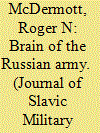

|
|
|
|
|
| Publication |
2014.
|
| Summary/Abstract |
Following the Russia-Georgia War in August 2008, Russia's conventional Armed Forces were subjected to a far reaching and unpredictable reform. Although the Armed Forces were long overdue reform, previous efforts rapidly failed for a variety of reasons including institutional inertia, in-fighting within the military elite and a lack of consensus on the goals and targets of such reform. The reforms of 2008-12 were therefore unprecedented since the creation of Russia's Armed Forces in 1992 following the disintegration of the USSR in late 1991; major changes were actually implemented. Yet, the reforms that followed were haphazard, poorly implemented and frequently experienced setbacks, reversals and an overall lack of coordinated policy efforts. These issues are examined in the following paper, exploring the roots of Russian defense planning weaknesses, and the numerous policy zigzags of the reforms to the structure of the Armed Forces, officer downsizing, NCO development and many other issues within a political-military culture that actually mitigates time-phased and fully worked-out planning cycles. Moscow's blindness to the utility of reliable military statistics will ensure continued 'blind planning' and institutional guesswork until obsessive secrecy and state level corruption give way to more scientific approaches to forming, implementing and managing such strategic level change within the country's defense and security structures.
|
|
|
|
|
|
|
|
|
|
|
|
|
|
|
|
| 7 |
ID:
075434
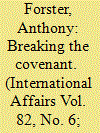

|
|
|
| 8 |
ID:
123451
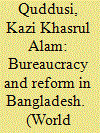

|
|
|
|
|
| Publication |
2013.
|
| Summary/Abstract |
Administrations run on the edifi ce of the bureaucracy. Positive civil service values should remain constant in all administrative ambiences. In Bangladesh however, negative phenomena have started acting against the growth of a wholesome bureaucratic culture. According to Kazi SM Khasrul Alam Quddusi reforms are necessary to keep the bureaucracy motivated and focussed.
|
|
|
|
|
|
|
|
|
|
|
|
|
|
|
|
| 9 |
ID:
148267
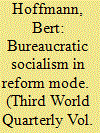

|
|
|
|
|
| Summary/Abstract |
Standard wisdom explains Cuba’s current transformation as one of economic change but political immobility. However, Cuban politics have also undergone a major change since the handing over of power from Fidel to Raúl Castro – even if the rhetoric used has been one of continuity. This article traces this process by looking at four areas: the depersonalisation and re-institutionalisation of the political structures; the diversification of the public sphere, particularly through the use of digital media; the liberalisation of travel and migration, with its transformative impact on state–citizen relations; and the turn to a moderate foreign policy, as highlighted by the rapprochement with the USA, with its implications for legitimising the underpinnings of Cuban socialism. Although the shift has been well below the threshold of a transition to multiparty democracy, Cuba has evolved from the charismatic model of the past to what can be understood as bureaucratic socialism in reform mode.
|
|
|
|
|
|
|
|
|
|
|
|
|
|
|
|
| 10 |
ID:
075500
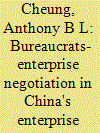

|
|
|
|
|
| Publication |
2005.
|
| Summary/Abstract |
This article explores the implementation of SOE reform in China at the local level, using case studies in Guangzhou as illustration. It is argued that local government spearheads a reform agenda that puts locally-defined state objectives first, not necessarily favouring enterprise restructuring. A full-fledged negotiation model does not exist in SOE reforms because all enterprises are controlled by the state and have to comply with top-down policies and orders. Government-enterprise relations and the degree of entrepreneurial power depend largely on the economic strength of the enterprise, with the boomers getting a good economic bargain while the laggards fail to gain sympathy from government. Enterprise workers are largely at the mercy of restructuring decisions that come from bargaining and at times collusion between managers and local bureaucrats.
|
|
|
|
|
|
|
|
|
|
|
|
|
|
|
|
| 11 |
ID:
130188
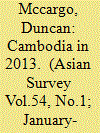

|
|
|
|
|
| Publication |
2014.
|
| Summary/Abstract |
Cambodia in 2013 was dominated by close-fought national elections on July 28, only narrowly won by the ruling Cambodian People's Party after an unexpectedly strong showing by the opposition. Generational change was a major theme of the year, seen in the growing activism of youth and the deaths of several prominent figures.
|
|
|
|
|
|
|
|
|
|
|
|
|
|
|
|
| 12 |
ID:
181412
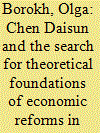

|
|
|
|
|
| Summary/Abstract |
Chen Daisun received his economic education in the United States in the 1920s. In the initial period of reforms, he proposed to selectively borrow from Western economics, including methods of quantitative analysis, experience in managing enterprises and using the market mechanism, and research on the negative consequences of industrialization. His recommendations combined the Marxist approach with a deep knowledge of modern economic theory. The scholar made a significant contribution to the return of the study of foreign economic thought in China. The author concludes that Chen Daisun's appeal to proceed from national specifics and try to create a highly developed Chinese economic science remains relevant in the current ideology of the PRC.
|
|
|
|
|
|
|
|
|
|
|
|
|
|
|
|
| 13 |
ID:
133464
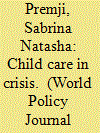

|
|
|
|
|
| Publication |
2014.
|
| Summary/Abstract |
In the winding alleyways of Mlolongo, one of Kenya's densest slums, heavy rainfalls from the previous night carpet the road with mud and animal waste, making both nearly impossible to avoid. Visitors approach and remove their shoes at the door to Mama Agnes' home, a mud shack, then step into a room where the air is pungent with the smell of urine and feces. In the darkness, one misstep and a visitor stumbles upon an infant, who seems unshaken by the accidental nudge. A few steps further lie two dozen more infants, none older than 18 months-some sitting on a broken couch, many lying on the concrete ground. Though all awake, their perfect little bodies remain still, only their bellies rising with each breath. In an eight-foot square space, there are at least 25 babies, and the only sound-silence.
|
|
|
|
|
|
|
|
|
|
|
|
|
|
|
|
| 14 |
ID:
110056


|
|
|
|
|
| Publication |
2011.
|
| Summary/Abstract |
A comparison of the processes of modernization in China and Russia shows that the key factor of its success is the quality of government: it must have a high degree of viability and at the same time be wholly interested in the far-reaching transformation of society. Such interest is generated when the country encounters critical challenges that threaten its existence, and the ruling class recognizes that the country's fate and their own are indivisible. A visible enhancement of the public's well-being is also a necessary condition of the success of reforms.
|
|
|
|
|
|
|
|
|
|
|
|
|
|
|
|
| 15 |
ID:
125257
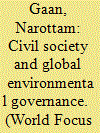

|
|
|
|
|
| Publication |
2013.
|
| Summary/Abstract |
The relation between civil society and environmental governance is not new. A number of developed states have introduced systems of green house gas emissions controls, but policy experience in this area is barely fifteen years old. Initiatives around adaptation are newer still. Thus societies are only beginning to learn what approaches are more or less promising. The power of ideas and the possibility of re-defining what is considered 'normal', 'possible' and 'acceptable' is often neglected in policy discussion. An example of power of ideas to shift policy frames is provided by the turn towards free markets and away from state provision that occurred in 1980s. Over the course of decades reforms aimed a reining back government and encouraging market growth dramatically altered expectation about boundaries of public- private economic activities-that is of civil society in broader sense.
|
|
|
|
|
|
|
|
|
|
|
|
|
|
|
|
| 16 |
ID:
103537
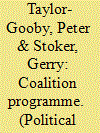

|
|
|
|
|
| Publication |
2011.
|
| Summary/Abstract |
The Coalition programme includes restructuring public provision through reforms and cuts which will take public spending in the Britain below that in the US. This article explores whether the Coalition agenda is best understood as a new approach to Britain's deep-seated economic short-comings or simply as the normal politics of gaining and retaining power. It analyses the current government's programme, identifies the common features across the range of policies and discusses how they are likely to develop as they encounter set-backs.
|
|
|
|
|
|
|
|
|
|
|
|
|
|
|
|
| 17 |
ID:
090424
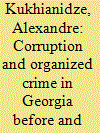

|
|
|
|
|
| Publication |
2009.
|
| Summary/Abstract |
The Soviet collapse in 1991 led to political turmoil, armed conflicts, rampant corruption, and to the growth of organized crime and smuggling in post-Soviet Georgia. Professional criminals called 'kanonieri kurdebi' ('thieves-in-law') captured the state, and criminalization of the government and law-enforcement structures caused a deep political crisis in the country and finally, revolutionary change of the political leadership. Massive arrests of most corrupt government officials, 'thieves-in-law', and other key criminals followed the Rose Revolution in 2003-2005. The new leadership implemented anti-corruption policies and law-enforcement reforms. The crime rate was reduced significantly. Yet, despite anti-corruption reforms, there continue to be repeated accusations of top government officials' involvement in 'elite corruption'. The lack of democracy and threats coming from Russia are the main reasons why Georgia remains a country of high risk, vacillating between stability and turmoil. Turmoil generates corrupt government and provides professional criminals with opportunities.
|
|
|
|
|
|
|
|
|
|
|
|
|
|
|
|
| 18 |
ID:
149818
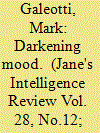

|
|
|
|
|
| Summary/Abstract |
concerns about government stability ahead of the 2018 presidential election are driving Vladimir Putin into reforms of Russia's security apparatus. Mark Galeotti surveys changes that could substantially reorient Moscos's internal security and espionage posture.
|
|
|
|
|
|
|
|
|
|
|
|
|
|
|
|
| 19 |
ID:
074948
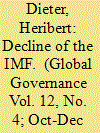

|
|
|
| 20 |
ID:
106344
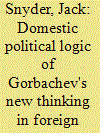

|
|
|
|
|
| Publication |
2011.
|
| Summary/Abstract |
In a chapter, in Myths of Empire (1991), I argued that Gorbachev was seeking to transform atavistic ideas and institutions that had been functional for the initial stage of building socialism, but had become fetters on production and a danger to Soviet security. New concepts of international relations were needed to reduce the dangers and costs of the old confrontational mindset, and also to justify a shift in domestic arrangements away from the military industrial complex, central planning and obsessive secrecy. Together with the international contextual factors that helped to set this process in motion, this domestic political dynamic explains both the peaceful end of the cold war and also the collapse of the Soviet system, which was an unintended byproduct of the democratizing tactics that Gorbachev used to overcome resistance from the old-school military-industrial and ideological elites. These arguments are generally supported by recent accounts of the Soviet collapse and the end of the cold war.
|
|
|
|
|
|
|
|
|
|
|
|
|
|
|
|
|
|
|
|
|